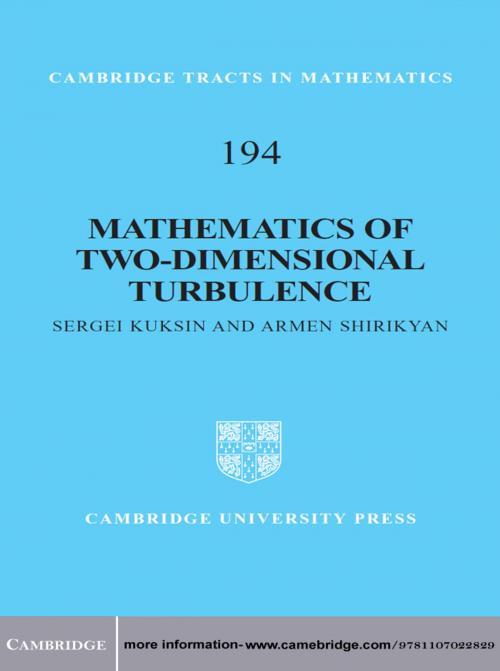Mathematics of Two-Dimensional Turbulence
Nonfiction, Science & Nature, Mathematics, Statistics, Science| Author: | Sergei Kuksin, Armen Shirikyan | ISBN: | 9781139579575 |
| Publisher: | Cambridge University Press | Publication: | September 20, 2012 |
| Imprint: | Cambridge University Press | Language: | English |
| Author: | Sergei Kuksin, Armen Shirikyan |
| ISBN: | 9781139579575 |
| Publisher: | Cambridge University Press |
| Publication: | September 20, 2012 |
| Imprint: | Cambridge University Press |
| Language: | English |
This book is dedicated to the mathematical study of two-dimensional statistical hydrodynamics and turbulence, described by the 2D Navier–Stokes system with a random force. The authors' main goal is to justify the statistical properties of a fluid's velocity field u(t,x) that physicists assume in their work. They rigorously prove that u(t,x) converges, as time grows, to a statistical equilibrium, independent of initial data. They use this to study ergodic properties of u(t,x) – proving, in particular, that observables f(u(t,.)) satisfy the strong law of large numbers and central limit theorem. They also discuss the inviscid limit when viscosity goes to zero, normalising the force so that the energy of solutions stays constant, while their Reynolds numbers grow to infinity. They show that then the statistical equilibria converge to invariant measures of the 2D Euler equation and study these measures. The methods apply to other nonlinear PDEs perturbed by random forces.
This book is dedicated to the mathematical study of two-dimensional statistical hydrodynamics and turbulence, described by the 2D Navier–Stokes system with a random force. The authors' main goal is to justify the statistical properties of a fluid's velocity field u(t,x) that physicists assume in their work. They rigorously prove that u(t,x) converges, as time grows, to a statistical equilibrium, independent of initial data. They use this to study ergodic properties of u(t,x) – proving, in particular, that observables f(u(t,.)) satisfy the strong law of large numbers and central limit theorem. They also discuss the inviscid limit when viscosity goes to zero, normalising the force so that the energy of solutions stays constant, while their Reynolds numbers grow to infinity. They show that then the statistical equilibria converge to invariant measures of the 2D Euler equation and study these measures. The methods apply to other nonlinear PDEs perturbed by random forces.















